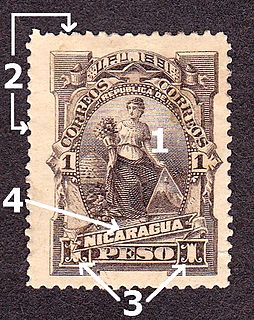
A letter is one person's written message to another pertaining to some matter of common concern. Letters have several different types: Formal letters and informal letters. Letters contribute to the protection and conservation of literacy. Letters have been sent since antiquity and are mentioned in the Iliad. Both Herodotus and Thucydides mention letters in their histories.

A postmark is a postal marking made on a letter, package, postcard or the like indicating the date and time that the item was delivered into the care of the postal service. Modern postmarks are often applied simultaneously with the cancellation or killer that marks the postage stamp(s) as having been used, and the two terms are often used interchangeably, if incorrectly. Postmarks may be applied by hand or by machines, using methods such as rollers or inkjets, while digital postmarks are a recent innovation. The local post Hawai'i Post had a rubber-stamp postmark, parts of which were hand-painted. At Hideaway Island, Vanuatu, the Underwater Post Office has an embossed postmark.

The mail or post is a system for physically transporting postcards, letters, and parcels. A postal service can be private or public, though many governments place restrictions on private systems. Since the mid-19th century, national postal systems have generally been established as government monopolies, with a fee on the article prepaid. Proof of payment is often in the form of adhesive postage stamps, but postage meters are also used for bulk mailing. Modern private postal systems are typically distinguished from national postal agencies by the names "courier" or "delivery service".
The Private Express Statutes (PES) are a group of United States federal civil and criminal laws placing various restrictions on the carriage and delivery of letters by all organizations other than the United States Postal Service.
This is a list of philatelic topics.

Registered mail is a mail service offered by postal services in many countries, which allows the sender proof of mailing via a mailing receipt and, upon request, electronic verification that an article was delivered or that a delivery attempt was made. Depending on the country, additional services may also be available, such as:
Private cancellations are cancellations of postage stamps, or in some cases, artist stamps applied by other than a government or other official stamp-issuing entity.
Franking refers to any devices, markings, or combinations thereof ("franks") applied to mails of any class which qualifies them to be postally serviced. Types of franks include uncanceled and precanceled postage stamps, impressions applied via postage meter, official use "Penalty" franks, Business Reply Mail (BRM), and other permit Imprints (Indicia), manuscript and facsimile "franking privilege" signatures, "soldier's mail" markings, and any other forms authorized by the 191 postal administrations that are members of the Universal Postal Union.

Postage due is the term used for mail sent with insufficient postage. A postage due stamp is a stamp added to an underpaid piece of mail to indicate the extra postage due.
A self-addressed stamped envelope (SASE), stamped self-addressed envelope (SSAE), or stamped addressed envelope (SAE) is an envelope with the sender's name and address on it, plus affixed paid postage, that is mailed to a company or private individual.

Freepost is a postal service provided by various postal administrations, whereby a person sends mail without affixing postage, and the recipient pays the postage when collecting the mail. Freepost differs from self-addressed stamped envelopes, courtesy reply mail, and metered reply mail in that the recipient of the freepost pays only for those items that are actually received, rather than for all that are distributed.
Courtesy reply mail, or CRM, is a type of mail in which a business sends pre-printed, self-addressed envelopes or postcards to customers, who then affix postage stamps to the envelopes or postcards and mail them back to the business. Alternatively, the business can disseminate the envelopes or postcards with stamps already affixed, similarly to metered reply mail.
Metered reply mail, or MRM, is a type of mail in which a business sends pre-printed, self-addressed envelopes or postcards to customers, with postage prepaid on the envelopes or postcards with a postage meter. It is thus similar to courtesy reply mail with a postage stamp already affixed.

This is a survey of the postage stamps and postal history of the British post office in Bangkok, Thailand.
Click-N-Ship is a service offered by the United States Postal Service that allows customers to create pre-paid Priority Mail shipping labels on ordinary printer paper. The labels include delivery confirmation numbers to track date and time of delivery or attempted delivery. Other than the cost of postage, there is no fee to create labels for Priority Mail, Priority Mail Express, Global Priority Mail, or Global Express Mail if the sender uses USPS Flat Rate envelopes or boxes.
Spam Harassment Reduction via Economic Disincentives (SHRED) is a proposed sender-at-risk E-mail stamp mechanism for reducing the E-mail spamming problem by indirectly increasing the cost of E-mail sending to the senders of unwanted E-mail. It aims to avoid the defects in earlier sender-at-risk mechanisms.

U.S. Special Delivery was a postal service paid for with additional postage for urgent letters and postal packets which are delivered in less time than by standard or first class mail service. Its meaning is different and separate from express mail delivery service. Essentially it meant that a postal packet was delivered from a post office to the addressee immediately once it arrived at the post office responsible for delivering it, rather than waiting for the next regular delivery to the addressee.

Pre-adhesive mail, also called pre-stamp mail, are letters carried in mail systems before the issuance of postage stamps. A stampless cover is another description and generally also refers to any item of mail sent before the issuance of postage stamps but it can also refer to mail sent, after the introduction of postage stamps, unpaid or without the pre-payment being indicated by the affixing of a postage stamp; it could have been pre-paid in cash and marked paid.

Official mail is mail sent from, or by, an authorized department of government, governmental agency or international organization and normally has some indication that it is official; a certifying cachet, return address or other means of identity, indicating its user. In some countries, postage stamps have been issued specifically for official mail.










